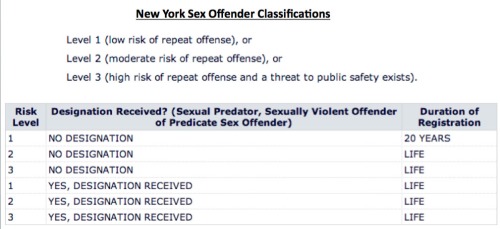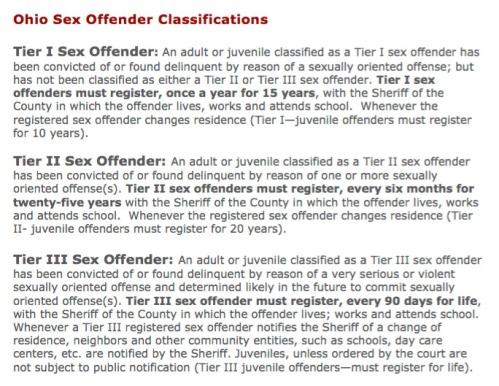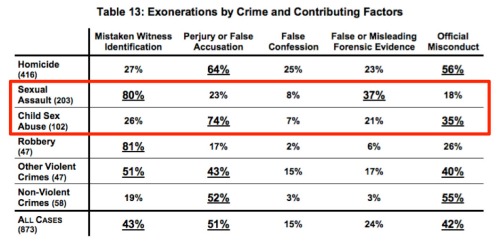
(Editorial Note: In no way do I want to minimize the issue of violence against women or children. Rape is clearly a crime of violence, and must be dealt with appropriately. Pedophile predation is abhorrant, and must also be dealt with sternly and appropriately. But I think the issue has become – what actually is appropriate for dealing with the range of sex offenses, and in some cases, have we gone too far; and what does this mean for the wrongfully convicted? It begs the age old question – does the punishment fit the crime?)
Woe be to the wrongfully convicted sex offender, because you’re not just a wrongfully convicted ‘felon.’ You’re a wrongfully convicted ‘sex offender,’ and the state makes sure you get some extra special attention. Note that I’m careful to use the qualifier “wrongfully convicted” here, because in the case of sex offenders, when the justice system “gets it wrong,” the injustice gets amplified. I’m not saying we should let actually guilty sex offenders off the hook, but the punitive measures have become so severe, that when someone is wrongfully convicted of a sex offense, the consequences they are forced to endure magnify the injustice.
To understand why a wrongful conviction in a sex offender case is such a travesty, you need to know a little about the sex offender laws and the mandatory, so-called “rehabilitation” methods. (This will be a little bit lengthy.)
Over the last few decades, states have been steadily rewriting their sex offense laws to become more and more draconian. I judge that this has been caused by something akin the to wave of hysteria that swept the US in the 80′s over preschool child sex abuse. The primary driver for this was the McMartin preschool case in which accusations were made in 1983. All charges were dropped in 1990, after the lives of all defendants involved were completely ruined. Because sex crimes, particularly those involving children, scrape a particularly sensitive region in the human psyche, it makes a great issue for politicians to campaign on. My opinion is that much of today’s sex offender legislation has had little, if any, basis in research, and is an all-too-typical legislative knee jerk to high profile cases that have created something of a bully pulpit for affected victims and families. You can’t blame the victims and families. Your heart has to go out to the them. They have suffered unspeakable tragedy. They want “justice,” but in the case of a wrongful conviction, that justice is visited upon the wrong person. Sadly, the legislative responses have proven to be the classically inefficient and expediency-driven political solutions that treat the symptom and not the disease. The key here is lack of research and the absence of statistically valid data. A classic example of this is “Megan’s Law,” which established the original sex offender registry. This law was enacted by the New Jersey General Assembly in 1994 in response to the rape and murder of seven year old Megan Kanka. Since then, the law has been enacted in some form by every state, and has also resulted in a federal FBI sex offender registry. However, a 2008 federally funded study conducted in New Jersey, where Megan’s Law was first enacted, found that it failed to reduce sex crimes or repeat offenders. Read that story here. If you’re interested in plodding through a 50 state survey of sex offender legislation, you can read the one done by the National Institute of Corrections and the Washington College of Law here.
Sentencing is just one area in which the sex offender laws have become more harsh. Here’s one recent example – the case of former NY Yankees outfielder, Chad Curtis, who has just been convicted of “inappropriately touching” three teenage girls in Michigan at a high school where he served as a volunteer weight room coach. He’s facing 15 years in prison. I do not know the details of the reported “inappropriate touching,” … but 15 years? For touching? Does that punishment fit that crime? Let me emphasize again that I do not want to be dismissive of the issues involving sexual aggressors and violence against women, but it just seems to this old brain that an act that a generation or so ago would have effectively been dealt with by some other means can now turn you into a convicted (and registered) sex offender. My observation has been that “zero tolerance” policies, while well meaning, always run afoul of the complexities of reality.
There are as many different versions of the sex offender laws as there are states, but one thing that has become a common denominator is the sex offender registry. Once released from confinement, a convicted sex offender must register with the state’s sex offender registry. The requirements for frequency of registration and duration of the registration period are tied to sex offender classification levels, which are intended to reflect the measure of risk to the public. The level for any individual offender is determined by the court in some states, and by an administrative board in others. Here are examples of the sex offender classifications from New York and Ohio:


You may wonder, “How can someone be wrongfully convicted of a sex offense?” It’s actually easier than you might think. The National Registry of Exonerations has reported on it’s data for the period 1989-2012, which includes data for 305 wrongful sex offender convictions, and please keep in mind this represents only a small fraction of the wrongful convictions that actually occur. The table below has the data for sex crimes highlighted, and it shows the contributing factors to the wrongful convictions. Note the percentages shown for each of the categories of crime add to greater than 100%, because any wrongful conviction can have more than one contributing factor.

The major contributing cause to wrongful convictions for sexual assault ismistaken eye witness identification. It’s been well documented that eye witness identification is very unreliable. But how could an assault victim mistakenly identify her attacker? It happens frequently, and if you don’t believe it, I strongly recommend you read the book “Picking Cotton” by Ronald Cotton and Jennifer Thompson Canino. The major contributing factor for child sex abuse isperjury or false accusation. One scenario here, although clearly not the only one, would be when a vindictive ex-spouse coaches her children into making false accusations against their father. Another way wrongful sex offender convictions can happen is when a vindictive ex-partner makes false claims about sexual assault. This is an offense which is, among adults, almost exclusively male-on-female in nature. Cases of female perpetrated forcible rape are rare indeed. Consequently, this is an area where it’s so often an issue of “He said. She said.” The wrongful conviction of Brian Banks, extensively reported on this blog, is a perfect example.
So what does happen when a sex offender is released from confinement, either through completion of sentence or parole? Just as with sex offender laws, the requirements vary by state, but it is universally required that the sex offender undergo a mandatory “rehabilitation” program, the details of which also vary by state. An example would be Rules for Sex Offenders in the Community from the state of Washington Department of Corrections. There are, however, some common threads that tend to run through these programs, and typical requirements would include:
1) You must register as a convicted sex offender. Your name and address will appear in a searchable online database of registered sex offenders. In most states, if the offense is anything more than minor, you can be required to register as a sex offender for 15 years, 25 years, or life.
2) Restrictions on where you can live. It is common for localities to pass ordinances that prohibit a convicted sex offender from living in certain areas; for example, within some specified distance from schools and parks.
3) Your place of residence may be marked by a public sign. Please refer to the graphic at the beginning of this article.
4) Mandatory therapy sessions. A key component of rehabilitation is considered to be therapy and counseling. It’s taken as a given, that for therapy to be successful, the subject must admit guilt and express remorse. In fact, the US Appellate Court Third Circuit, in a 2010 decision that has been classified as “precedential,” ruled that it is legitimate to require admission of guilt from sex offenders before being placed in rehabilitation programs, which is a requirement of their parole. If a defendant fails to admit guilt, he can be denied parole, or if he is in “rehabilitation,” he can be sent back to confinement.
5) Polygraph evaluation. There has been much written on this blog about the questionability of the polygraph. Mary D. Devoy is an activist in Virginia who has been pressing for data driven reform to the Virginia sex offender registry. She maintains a blog titled, It’s Time to Reduce, Reconstruct, Reclassify, Rethink and Reform the Virginia Sex Offender Registry. She also has much to say about the use of the polygraph in sex offender rehabilitation. After reading the article on this blog The ‘Catch 22′ of Parole for the Wrongfully Convicted, she sent me a “letter,” which she has consented that I share. Please read it here: Devoy Letter.
6) Plethysmograph evaluation. What’s that? The plethysmograph is a cousin to the polygraph. A mercury filled rubber ring or metal band with a strain gauge (or sometimes an air filled cuff) is placed around the shaft of the subject’s penis, and measures “penile tumescence.”

The subject is then exposed to photographs, audio, and video of sexually charged situations, and his erectile response is measured. This is supposed to be a gauge of how well he can control his urges. The state of Colorado was an early adopter of this practice (Colorado Sex Offender Manual). However, there is no statistically valid data that shows correlation with any ability of this practice to predict future behavior, with the possible exception of the use of images of children with pedophiles, which has a marginal (32%) accuracy as determined by studies. The most definitive statement I have found concerning this practice comes from Robert M. Stein, Ph.D. from the Center for Neurobehavioral Health, Ltd., Lancaster, PA, who, from 1982-1988, was the Director of the Psychophysiological lab at the Sexual Behavior Clinic in New York City. He personally (not through a technician) assessed and treated over 700 adolescent and adult sex offenders. His comments (abbreviated):
. a. Plethysmograph data is totally useless for determining guilt or innocence regarding deviant sexual acts. It would be like using a personality test to convict someone of burglary.
. b. Plethysmographic data have no diagnostic value of any kind.
. c. About one-third of offenders show no arousal in the lab.
7) You may be required to wear a GPS tracking ankle bracelet, as was the case with Brian Banks.
SO, WHAT’S MY POINT HERE? WELL …. IMAGINE THIS:
A rape victim has mistakenly identified you as her attacker. She testifies in court, and points you out to the jury. You are wrongfully convicted of sexual assault. After serving many years in prison, you’ll do anything to get out, and are willing to admit guilt and express remorse – even though you didn’t do it, and after several attempts, you are granted parole. Upon release, you have to register as a sex offender, and continue doing so for the rest of your life. You have to enter a rehabilitation program run by the department of corrections. Local ordinances force you to live in a rural area. The only job you can get is flipping burgers. You have to wear a GPS tracking ankle bracelet. The Sheriff puts a sign outside your residence stating that you are a convicted sex offender, and this is where you live. You have to attend therapy sessions in which youhave to talk about the rape (you didn’t do). You are periodically subjected to arbitrary polygraph examinations. You are periodically subjected to degrading plethysmograph evaluations. And …. you didn’t do it.
WOE BE TO THE WRONGFULLY CONVICTED SEX OFFENDER.

